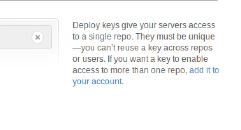Accessing multiple private GitHub repositories without a dedicated build user
We have been using GitHub at EclipseSource for roughly 2 years now. Using it as a company means that we are hosting all our internal projects, products and many customer projects on GitHub. GitHub was (and is) a great solution for us, except when it came to accessing multiple private GitHub repositories from our build server.
 Basically this is not a problem because you can add deploy keys to any GitHub repository to make it accessible from a build server. The real problem comes up when you try to access two or more GitHub repositories from the same server. This is because you can only use an SSH key once as a deploy key. A workaround for this problem is to create a dedicated GitHub user just for the build but this is not very clean. It would be much cooler to use deploy keys. Some time ago, a colleague of mine, Ian Bull, came up with a solution for our build server.
Basically this is not a problem because you can add deploy keys to any GitHub repository to make it accessible from a build server. The real problem comes up when you try to access two or more GitHub repositories from the same server. This is because you can only use an SSH key once as a deploy key. A workaround for this problem is to create a dedicated GitHub user just for the build but this is not very clean. It would be much cooler to use deploy keys. Some time ago, a colleague of mine, Ian Bull, came up with a solution for our build server.
The idea is to create an SSH key pair for every private GitHub repository. You can create a key pair using this command on a Linux machine:
ssh-keygen -t rsa -f ~/.ssh/id_rsa.REPONAME
The prompt will ask for a password, however, setting a password in this case is not recommended. When the keys are accessed, there is no user logged onto the build machine to type the password ;). After creating the key pair the public key can be found in ~/.ssh/id_rsa.REPONAME.pub. This is the key that acts as the deploy key for a repo on GitHub. When using multiple SSH keys, the build server needs to know which one it should use when accessing github.com. To solve this we have to edit the SSH config in ~/.ssh/config and add an entry like this:
Host github-REPONAME
HostName github.com
User git
IdentityFile /home/build/.ssh/id_rsa.REPONAME
With this entry we are telling SSH to use the id_rsa.REPONAME key when accessing github.com with the hostname github-REPONAME. This gives us the ability to create a hostname accociated with its dedicated deploy key for every private GitHub repository. The last thing we have to do now is to access the private GitHub repository with the new hostname from the build server e.g. in a Jenkins job.
At this point I want to thank Ian for coming up with this solution - it really helps a lot. If you have any other working solutions please feel free to share them in a comment.
